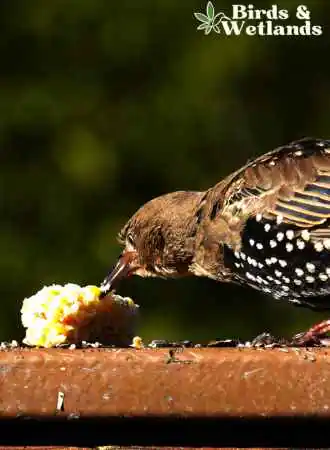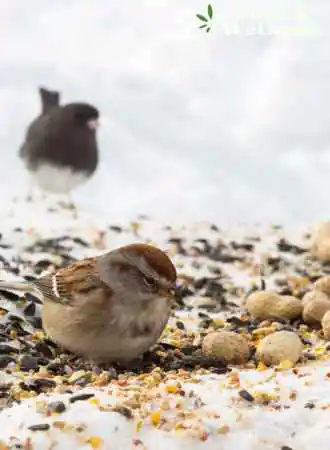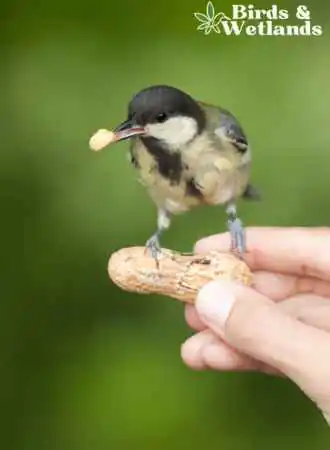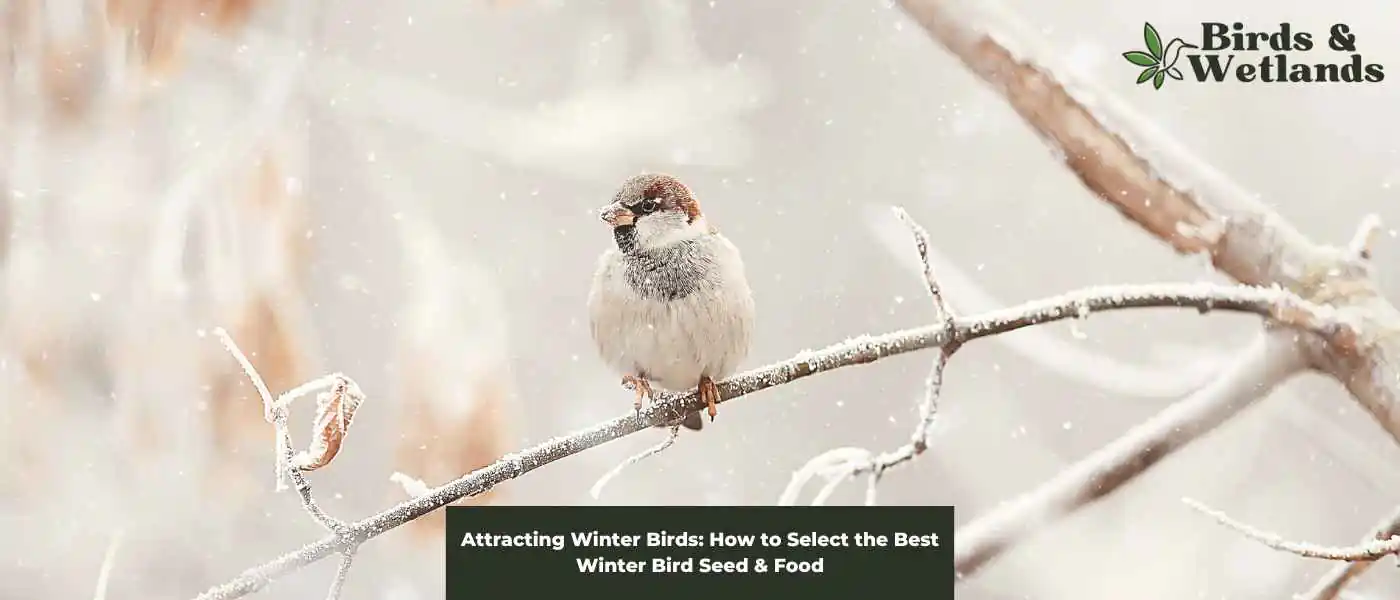When winter arrives, many of us turn to our backyard bird feeders to help our feathered friends survive the cold months. But with so many types of bird seed available, it can be difficult to know which one to choose. What’s the best option for the birds that visit your yard?
Key Takeaways on Best Winter Bird Foods
Winter bird feeding is a fun and rewarding experience for backyard birders because it allows them to observe a variety of bird species up close. It also provides the birds with a reliable food source during a time when their natural food supply may be scarce. Feeding birds in the winter can help to support their survival and well-being through the colder months.
Things to Keep in Mind
Providing bird seed in winter is a great way to attract a variety of birds to your yard while also helping them survive during cold months when food can be scarce. However, not all bird seeds and foods are the same, and different types will attract different types of birds. Here are some tips on how to select the best winter bird seed and food:
- Understand Your Local Birds: The first step in choosing the right bird seed and food is to understand what types of birds are native to your area or migrate through it in winter. Some birds, like cardinals and sparrows, prefer sunflower seeds, while others, like finches, prefer thistle (nyjer) seeds. You can learn about local bird species from books, online resources, or local Audubon Society chapters.
- Choose High Energy Foods: During the winter, birds need high-energy, high-fat foods to help them survive the cold. Black oil sunflower seeds are a great choice because they’re high in fat and calories. Suet, which is a type of animal fat, is also highly beneficial for birds in the winter.
- Offer a Variety: Consider offering a variety of seeds and foods to attract a range of species. Mixed seed bags typically include a blend of sunflower seeds, millet, corn, and other grains that appeal to a wide range of birds. Nyjer (thistle) seeds will attract finches and other small birds, while larger birds like woodpeckers, nuthatches, and starlings will appreciate suet cakes or balls.
- Quality over Quantity: Quality bird seed will contain fewer fillers like milo, wheat, and cracked corn, which many birds won’t eat. Look for seed mixes that primarily contain black oil sunflower seeds, hulled sunflower seeds (also called sunflower hearts), or white proso millet.
- Avoid Cheap Mixes: Cheap bird seed mixes often contain a lot of filler materials that birds won’t eat. These fillers end up being wasted and can make a mess in your yard.
- Provide Fresh Fruit: Some bird species, like robins, cedar waxwings, and bluebirds, enjoy fresh fruit. Apples, oranges, and other fruits can be put out on a tray feeder.
- Offer Mealworms: Insect-eating birds like bluebirds, wrens, and robins also enjoy mealworms, which can be purchased live or dried.
- Water Supply: Don’t forget about water. Birds need fresh water for drinking and bathing, even in the winter. Consider providing a heated birdbath or a bird bath de-icer to ensure the water doesn’t freeze over.
- Safe Feeding Practices: Make sure the feeding area is safe from predators, clean, and quiet. Regularly clean the feeders to prevent the spread of disease.
Remember, while bird feeding can provide a significant portion of a bird’s diet, they also rely on natural food sources. Planting native trees, shrubs, and plants that produce seeds, berries, and nectar can also help provide for birds throughout the year.
Best Winter Foods for Birds
Black Oil Sunflower Seed
- High Nutrient Content: The Blue Seal Premium Black Oil Sunflower Wild Bird Seed is high in fat and protein, providing essential nutrients to wild birds especially during harsh winter months.
- Attracts Diverse Species: The seeds are known to attract a wide variety of wild birds, such as Northern Cardinals, Tufted Titmice, Mourning Doves, and Evening Grosbeaks, thereby enhancing your bird-watching experience.
- Increased Survival Rates: The presence of these bird seeds in your feeder can increase bird survival rates by up to 38%, contributing to the conservation of local bird populations.
- Promotes Overall Health: Offering a consistent and reliable source of feed like this can lead to less stress and greater overall health in the bird population visiting your garden.
Black oil sunflower seeds are a type of seed that comes from the sunflower plant. These seeds are a popular choice for bird feeders, especially in winter when birds need extra nourishment to survive the cold weather. Nearly every bird that visits your backyard will eat these seeds.
One of the reasons that black oil sunflower seeds are so good for birds in winter is that they are high in fat and protein. This makes them an excellent source of energy for birds, which need to maintain their body heat and keep their metabolism going to survive the harsh winter conditions.
Moreover, sunflower seeds have a thin shell, which makes them easy for birds to crack open and eat. This is especially important in the winter, when birds may have difficulty finding food and need to conserve their energy.
Black oil sunflower seeds are also relatively affordable and easy to find. You can purchase them at most feed stores and garden centers, and they are often available in bulk, which can be more cost-effective if you have a lot of birds to feed.
These seeds attract most birds including black-capped chickadees, dark-eyed juncos, American goldfinches, mourning doves, house finches, northern cardinals and other larger birds.
Thistle Seed
- No-Grow Feature: The seeds are heat treated, reducing their germination power. So even if seeds fall onto the ground, they won’t grow into plants, keeping your garden neat.
- Attracts Specific Birds: These seeds attract finches, Mourning Doves, Siskins, Tufted Titmice, Chickadees, Cardinals and other songbirds, making it perfect for those aiming to attract specific bird species.
- Long Shelf Life: The heat treatment increases the shelf life of seeds, ensuring that they retain their quality and nutrients for longer.
- High Nutrient Content: The Nyjer/Thistle seeds have a high crude fat content (min 30%), crude fibre (max 35%), and crude protein (min 16%), providing a nutritious meal for the birds.
Thistle seeds, also known as nyjer seeds, are small black seeds harvested from the African yellow daisy, a sunflower plant. These seeds are highly nutritious and beneficial for birds in winter. They are offered in a tube feeder.
During winter, birds face a scarcity of natural food sources, making it difficult to meet their nutritional needs. Thistle seeds provide a rich source of protein, fat, and fiber, making them an excellent supplement to their diet.
These seeds are especially beneficial for small birds like purple finches, pine siskins, and goldfinches, which have high metabolic rates and require a high-calorie intake to maintain their body temperature.
Thistle seeds have a high oil content, which helps wild birds to maintain healthy feathers and provides them with the energy they need to keep warm during cold winter days. Their small size also makes them easy to consume for small birds with delicate beaks.
To provide thistle seeds for birds during the winter, you can purchase a thistle bird feeder and fill it with fresh seeds regularly. Be sure to clean the feeder periodically to prevent the growth of harmful bacteria or mold.
It’s also essential to place the feeder in a location that is sheltered from harsh weather conditions, such as strong winds or heavy snow.
Safflower Seed
- Squirrel Deterrent: The safflower seeds are bitter to squirrels, serving as a natural deterrent, and thus focus solely on attracting a variety of birds to your garden.
- High Nutritional Value: Rich in fats and proteins, these seeds provide the essential energy and nutrition that backyard birds require, enhancing their overall health and vitality.
- Clean and Healthy: The triple-cleaning process ensures dust and debris are removed before packaging, offering a clean and healthy food source to your feathered friends.
- Pleasant Aroma: The seeds not only look good but also have a fresh and pleasant smell, making them an even more appealing snack for birds.
Safflower seeds are the seeds of the safflower plant, a member of the sunflower family. The seeds are small, white, and oval-shaped, with a hard outer shell. Safflower seeds are a popular bird food source and among the best foods for many smaller birds, especially during the winter months.
One of the main reasons that safflower seeds is a favorite food among birds in winter is that they are high in fat and protein, which helps birds maintain their energy levels during the colder months. Birds need more calories in the winter to stay warm, and safflower seeds provide a nutritious and energy-dense food source.
Another benefit of safflower seeds is that they are less attractive to squirrels and rodents than other birdseed types. This is because safflower seeds have a bitter taste that many mammals do not like. By offering safflower seeds to birds, you can help prevent squirrels and other pests from raiding your bird feeder (even home made ones work).
Safflower seeds are a good choice for people who want to attract a diverse range of bird species to their yards. Many different types of birds, including common redpolls, cardinals, chickadees, finches, nuthatches and other birds, are known to enjoy safflower seeds.
What other foods can you feed birds in winter?
Winter can be challenging for birds as they struggle to find food sources in cold and harsh weather conditions. While many people put out bird feeders filled with seeds, there are a variety of other foods that you can offer to support your feathered friends during the winter months.
Suet

Birds have many ways of keeping warm but they still need helping with regard to food. Suet is among the favorite foods of many wintering birds, especially those that inhabit colder regions. Suet is a type of fat that is derived from the hard white fat that surrounds the kidneys and loins of cows and sheep. It is often offered in a suet feeder.
During the winter months, many hungry birds find it challenging to locate enough food to sustain themselves. The harsh weather conditions make it difficult for birds to forage for their usual diet of insects and seeds. This is where suet comes in. Suet provides birds with a high-energy food source that they can rely on to survive the winter.
Suet is an excellent food source for birds because it is high in calories and easily digestible. Birds can quickly convert fat into energy to help them maintain their body temperature and stay warm. Suet is high in protein, which is essential for many visitors to maintain their strength and health.
Birds that are known to consume suet include red-bellied woodpecker, chickadees, nuthatches, tufted titmice and blue jays, among others. Suet is often served to birds in the form of suet cakes or suet balls that are hung from trees or bird feeders.
Uncle Jim’s Worm Farm Live Mealworms
Superior Quality Feed
Uncle Jim’s Worm Farm Live Mealworms offer exceptional quality and value, proving to be a reliable and efficient feed source for birds and small animals.
Pros
- Consistent Quality: With two orders showcasing a clear consistency in worm health and delivery, this product is reliable, offering a robust supply of live mealworms that are healthy and thriving upon arrival.
- Ease of Use: The worms come with simple instructions for care and feeding, making the process straightforward even for beginners.
- Excellent Packaging and Shipping: The worms are carefully packaged and shipped promptly, often arriving before the expected delivery date.
- Longevity: Depending on conditions like moisture, feed, and temperature, the mealworms can last up to nine months, providing long-term feed solutions.
- Guaranteed Live: The mealworms are guaranteed to arrive alive, providing peace of mind for buyers who might have concerns about the viability of live shipments.
Cons
- Care Requirement: While care instructions are provided, looking after the mealworms does require some effort. The need to provide substrate and food, and potentially refrigerate the worms could be seen as inconvenient by some.
- Packaging: Although the packaging ensures safe and efficient shipping, the use of a semi-cloth bag might not be to everyone’s liking. Some customers have found handling and storage in such packaging a bit difficult.
Mixed Seeds

Bird mixed seed is a combination of various types of birdseed and other food, such as sunflower, safflower, cracked corn and white proso millet, that are specifically formulated to attract feeder birds. These seeds are offered in ground feeders with other foods such as dried fruit and meal worms and are especially good for birds during the winter when natural food sources are scarce, as they provide important nutrients and energy to help them survive the cold weather.
The high fat content in these seeds, for example, helps birds maintain their body heat, while the fiber in millet aids in digestion. Mixed seed is also a convenient way for bird lovers to provide food for their feathered friends, and can be easily found at many pet and garden stores.
It’s important to note, however, that not all birds prefer birdseed mixes, and some may have specific dietary needs requiring different food types.
Nuts

During winter, many species of birds rely on nuts as a vital food source. Nuts such as acorns, beech nuts, and hazelnuts are particularly important, as they provide birds high levels of fats and proteins that can sustain them throughout the winter months. These fats and proteins give birds the energy to maintain their body temperature and stay warm during cold weather.
Also, nuts are easy for birds to store, as they can be buried or hidden away in crevices for later consumption so birds are well-stocked.
Many birds eat peanuts so they are a good winter food for them. You can offer birds peanut hearts together with more food such as orange wedges.
Finally, nuts are a great source of essential nutrients, such as vitamins and minerals, which help birds maintain their overall health and well-being.
Remember, winter bird feeding helps many birds in the winter season, giving them nutritious food gives them the energy boost they need to survive.






